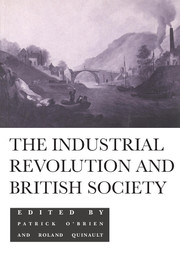Book contents
- Frontmatter
- Contents
- List of contributors
- Preface
- 1 Introduction: Modern conceptions of the Industrial Revolution
- 2 Women in the workforce
- 3 Reinterpretations of the Industrial Revolution
- 4 Religion and political stability in early industrial England
- 5 Sex and desire in the Industrial Revolution
- 6 Political preconditions for the Industrial Revolution
- 7 Crime, law and punishment in the Industrial Revolution
- 8 The Industrial Revolution and parliamentary reform
- 9 Margins of the Industrial Revolution
- 10 Social aspects of the Industrial Revolution
- 11 Technological and organizational change in industry during the Industrial Revolution
- Postscript: An Appreciation of Max Hartwell
- Index
7 - Crime, law and punishment in the Industrial Revolution
Published online by Cambridge University Press: 05 June 2012
- Frontmatter
- Contents
- List of contributors
- Preface
- 1 Introduction: Modern conceptions of the Industrial Revolution
- 2 Women in the workforce
- 3 Reinterpretations of the Industrial Revolution
- 4 Religion and political stability in early industrial England
- 5 Sex and desire in the Industrial Revolution
- 6 Political preconditions for the Industrial Revolution
- 7 Crime, law and punishment in the Industrial Revolution
- 8 The Industrial Revolution and parliamentary reform
- 9 Margins of the Industrial Revolution
- 10 Social aspects of the Industrial Revolution
- 11 Technological and organizational change in industry during the Industrial Revolution
- Postscript: An Appreciation of Max Hartwell
- Index
Summary
Introduction
Thomas Carlyle, in many of his writings in the 1820s and 1830s, drew attention to the dramatic changes which the Industrial Revolution was bringing to the society around him. ‘[B]ut cannot the dullest hear Steam-engines clanking around him?’, he wrote in Sartor Resartus in 1838, ‘at home not only weaving Cloth, but rapidly enough overturning the whole system of Society …?’ Among the many areas which were ‘overturned’ and ‘revolutionized’ in the period between 1780 and 1860 was the handling by the British state of the issues of crime, the criminal law, law-enforcement and punishment.
In late-eighteenth-century England, Wales, Scotland and Ireland, the systems of criminal law, law-enforcement and punishment in force were very different from those we associate with the modern state. The criminal law – the so-called ‘Bloody Code’ – gave central prominence to capital punishment, with over 200 offences, most of them offences against property, punishable by death. There were few secondary punishments, other than death or transportation, for serious offences, and long-term imprisonment was not used as a punishment in itself. But, if the criminal code and punishments were harsh, the means of law-enforcement were weak and uncoordinated, and the system contained apparent contradictions. There were no full-time paid uniformed police forces; policing agencies were local, decentralized and mostly unpaid.
- Type
- Chapter
- Information
- The Industrial Revolution and British Society , pp. 156 - 182Publisher: Cambridge University PressPrint publication year: 1993
- 5
- Cited by



